Mitsui Fudosan Worldfarm Co., Ltd. Established to Promote Agriculture and Create Employment through the Sustainable Smart Farm Business
Proposing Multi-Location Urban and Exurban Life Rooted in Agriculture
August 3, 2020
Mitsui Fudosan Co., Ltd.
World Farm Co., Ltd.
Mitsui Fudosan Co., Ltd., a leading global real estate company headquartered in Tokyo, and World Farm Co., Ltd. (“World Farm”) announced today the start of full-fledged participation in the agricultural business in Tokyo and exurban areas from August 1 through the establishment of Mitsui Fudosan Worldfarm Co., Ltd. ( “MFWF”) for the purposes of raising the productivity of farmland through the sustainable smart farm business* and creating a new form of city development that connects people in urban and exurban areas rooted in agriculture.
Key Points of This Press Release
- Mitsui Fudosan and World Farm established Mitsui Fudosan Worldfarm Co., Ltd. to develop the sustainable smart farm business utilizing technology in order to promote Japanese agriculture and create employment in exurban areas. The new company commenced operations on August 1.
- The new company will accommodate people’s diversifying work/lifestyles by providing flexible working conditions such as remote work and by accepting not only people interested in agriculture as a profession but also people who want to work in agriculture without being tied to any specific time or place while maintaining their own job.
- By advancing city development that enables mutual exchange between urban and exurban dwellers, the new company will pursue innovation for raising agriculture profitability and the creation of new industries.
- Sustainable smart farm business:
Refers to a new agricultural business model with high productivity achieved by combining technology with the profitable agriculture mechanisms implemented by World Farm, further increasing the efficiency of agricultural work processes and effectively developing human resources.
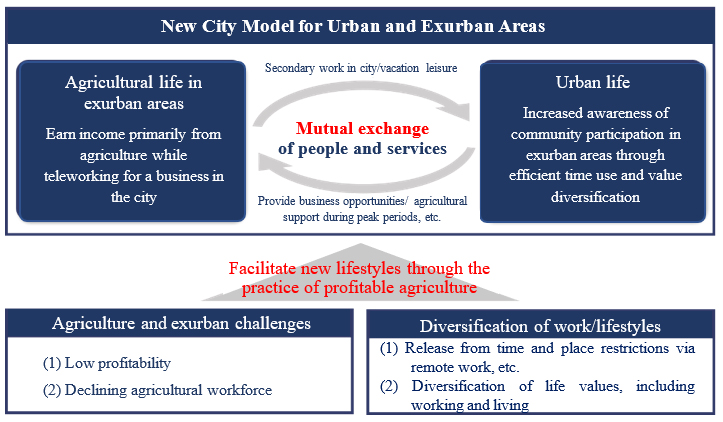
■Establishment Background
Japanese agriculture faces numerous challenges for raising profitability while the agricultural workforce is declining each year. Agricultural workers are also aging on average and abandoned farmland is increasing. Municipalities with extensive farmland not only face increasing social costs but are also unable to create employment locally, which results in an increasing outflow of young people to urban centers. To help solve these problems facing such areas, MFWF was established by World Farm, which practices profitable agriculture, and Mitsui Fudosan, which has been actively involved in community development. MFWF develops sustainable smart farms in exurban areas to increase the number of agricultural workers, help promote agriculture in Japan and contribute to the stable supply of safe and secure Japan-grown vegetables. In addition, by providing employment opportunities with diverse ways of participating in agriculture and facilitating interactions and knowledge sharing between people from urban and exurban areas through agriculture, the new company will further increase agricultural productivity and, moreover, help form cities where new industries are created linking urban and exurban areas rooted in agriculture.
■Business Planning and Design
This business will be promoted as a part of Mitsui Fudosan’s venture co-creation project. In launching MFWF, with support from BASE Q*, which facilitates open innovation by major companies, the process to obtain internal approval was accomplished in the short span of around six months starting from initial business review. Support from BASE Q started with formulating MFWF’s management vision and covered a broad range from creating a specific business plan to crafting a vision for synergies with the Mitsui Fudosan Group. Comprehensive and detailed support utilizing BASE Q’s know-how has resulted in an expeditious business development process.
- BASE Q:
Provides an innovation-building program for entrepreneurs (managers in charge of new business development) at major companies based on the practical experience and knowledge in open innovation of Mitsui Fudosan, Dentsu and EY Japan. Integrated support is provided for the full range of open innovation processes, from organizing strategy to searching for partners and launching joint projects. It is also involved in education and community-building to discover and train innovation professionals.
■Five Characteristics of MFWF’s Sustainable Smart Farm Business
1) Farm business with integrated production and processing
2)Organized and planned farm management through group farming
3)Production limited to vegetables for processing and commercial use
4)High productivity through use of technology
5)Establishment of innovation co-creation sites with urban and exurban dwellers
1)Farm business with integrated production and processing
MFWF will develop the farm business promoted by World Farm, which features integrated production and processing. Employees, as multi-skilled workers, handle both vegetable production and processing at the facility. Integrated production-processing operations make possible more efficient use of human resources.
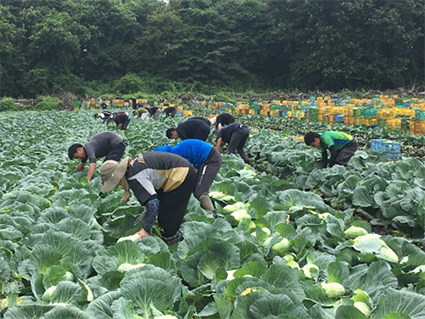
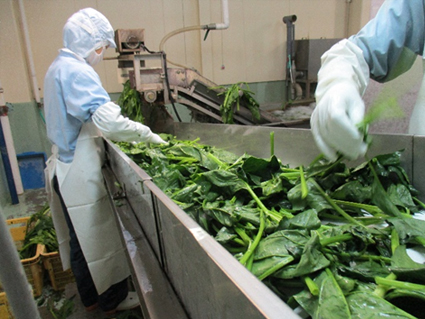
2)Organized and planned farm management through group farming
High productivity will be achieved through the practice of group farming, which involves optimal personnel assignments and division of duties, full clarification of business processes, and organized farm management with multiple people.
In addition, working hours will be fully clarified and labor management rigorously conducted to provide a reassuring and pleasant work environment for farm workers.
3)Production limited to vegetables for processing and commercial use
Primarily handling processed refrigerated and frozen vegetables*, which have firm sales prices and can be preserved for a fixed period of time, will provide the business with stable profits.
- Processed refrigerated and frozen vegetables: Processed vegetables for commercial use that are primarily used at schools and restaurants. They are also used as ingredients at major ramen restaurant chains, in frozen dumplings for home consumption and as ingredients for major frozen foods manufacturers. Removing any damaged portions allows the vegetables to be processed into products, which makes them effective as a measure for increasing yields and reducing food loss.
4)High productivity through use of technology
MFWF will consider measures that include ICT-based farm management systems, collecting data related to weather and work processes from growth to harvest, remote communication for worker education and training, and automating a portion of vegetable processing.
This will be accomplished through CVC investment made by Mitsui Fudosan’s Venture Co-creation Department while leveraging its track record of collaboration and support for venture companies.
5)Establishment of innovation co-creation sites with urban and exurban dwellers
MFWF will maintain an environment that enables employees to work remotely and through other formats and establish systems for employing people seeking to become agricultural professionals as well as people who want to be involved in agriculture in various forms while also having their own job.
Through the participation of diverse people in this business, MFWF will work to form a site for innovation co-creation to discover agricultural production and processing methods that contribute to profitability, local tourism related to farming and its ripple effects on the hotel and restaurant industry, and direct sales to cities and overseas sales of processed vegetables for commercial use, and to create new businesses with a focus on orchards and other production activities tailored to regional characteristics.
■Schedule Going Forward
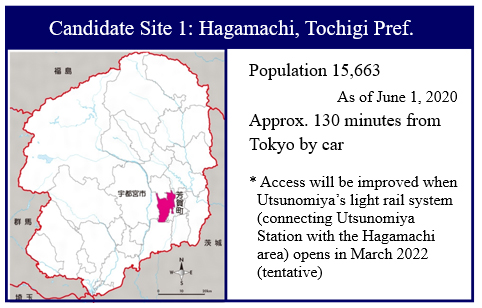
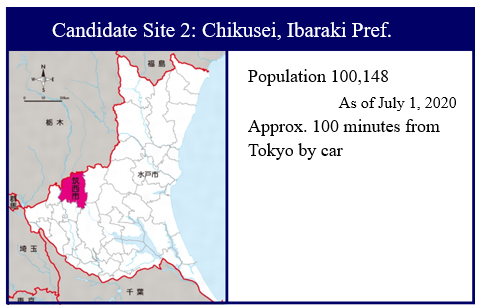
- August–September 2020: Plan to steadily commence farm operations on approx. 6 hectares in the areas around Hagamachi, Tochigi Pref. and Chikusei, Ibaraki Pref.
- Spring–Summer 2021: Completion of refrigeration facility for cut cabbage
- Spring–Summer 2023: Completion of freezing facility for spinach and broccoli
- 2025 (tentative): Expand business scale to approx. 100 hectares in the areas around Hagamachi, Tochigi Pref. and Chikusei, Ibaraki Pref.
In the future, the company plans to expand farming to 3,000 hectares in exurban areas of major cities
■Comments from People Involved
Comment from Hiroshi Ueno, President & CEO of World Farm
World Farm has conducted a variety of creative initiatives up to the present, and we’ve discovered various rules of thumb and cultivated extensive knowledge for raising productivity by conducting all processes from growing to processing to selling in an integrated manner. However, if asked whether we can provide all that information in a tangible form, it is actually quite difficult. In the world of farming, there’s a saying, “10 years of watering,” which means you have to gain experience over many years in order to develop the ability to respond appropriately to nature. We think that the difficulties of agricultural skill transmission may someday be solved through the development of the ICT and AI industries, but to stop the rapid decline of Japanese agriculture, there is a need right now to train professional farmers with a view to 50 or 100 years into the future.
World Farm has practiced profitable farming by designing the “making” of vegetables and sales channels and the “growing” of human resources and local communities. This alliance with Mitsui Fudosan, in addition to the above, will make possible “increasing” production volume and capacity and “expanding” activities in society. We intend to continue drawing on the power of youth and new demand creation to promote agriculture and thereby revive local communities and build a bright future for Japan.
Comment from Hirofumi Iwasaki, President & CEO of Mitsui Fudosan Worldfarm Co., Ltd.
(Also affiliated with Mitsui Fudosan’s Venture Co-creation Department)
Against a backdrop of evolving technology, people’s lives will continue to diversify further going forward. I believe that a “rich” society is one where people can choose their own lifestyles, and we are committed to conducting city development capable of broadly accommodating this need.
The impact of the coronavirus is prompting many people to reconsider their lives, both in terms of working and living, and how they relate to their families and larger society, which form the foundation for their lives. I firmly believe that demand for this type of city development will only accelerate going forward as a result.
In addition, in response to societal challenges posed by the decline of agriculture and resulting local population outflows, there are many people, even among our customers, who want to contribute in some form to solving the problem. In order to meet these needs as well, we are conducting city development to make it possible to participate in agricultural promotion with one’s life located in both urban and exurban areas. Mitsui Fudosan has conducted many different community-development initiatives in central and outlying areas to meet the needs of the people who live there, so I believe it is in a unique position to make this project a success as well.
Mitsui Fudosan does not have expertise in farming per se, but leveraging know-how in co-creation projects utilizing open innovation to date, we are joining up with World Farm, which practices profitable agriculture, to work to overcome these challenges.
We intend to pursue city development that enables new industries rooted in agriculture to be created to realize a society and a “richness” that allows people to choose their lives.
■World Farm Co., Ltd. (https://www.world-farm.co.jp/)
World Farm is an agricultural corporation that practices profitable agriculture by acquiring 100–200 hectare patches of farmland and processing and selling vegetables grown on directly operated farms and in partnership with local growers (as a sixth-order agricultural industry). It runs a project to promote the nationalization of agricultural products, specifically to replace 500,000 tons of imported vegetables with vegetables grown in Japan, and focuses on training the next generation of farmers to support the future of Japanese agriculture. The company seeks to build new models for sustainable agriculture from the dual standpoint of new demand creation and human resource development.
World Farm has developed its Agribusiness Utopia Vision, a comprehensive summary of this initiative, and works closely with local communities to solve issues facing Japanese agriculture, including a declining and aging agricultural workforce, a lack of successors, and an increasing amount of abandoned farmland.
<Company Profile>
Established: January 26, 2000
Representative: Hiroshi Ueno, President & CEO
Head office: 3395-1 Yatabe, Tsukuba-shi, Ibaraki Pref.
Website: https://www.world-farm.co.jp/
Facebook: https://www.facebook.com/worldfarm.jp
■Mitsui Fudosan Co., Ltd. [Web] Venture Co-creation Department
(https://www.mitsuifudosan.co.jp/venture/)
Mitsui Fudosan is striving to co-create business with startups to create new industries with a view to expanding its business domains and bolstering its core operations. In April 2015, Mitsui Fudosan set up the Venture Co-creation Department. Leveraging the operation of offices for startups and its expansive business ecosystem and diverse array of business fields, Mitsui Fudosan targets the co-creation of new industries with startups based on the three pillars of finance, community, and support.
■Mitsui Fudosan Group’s Contribution to SDG
https://www.mitsuifudosan.co.jp/corporate/esg_csr/
The Mitsui Fudosan Group aims for a society that enriches both people and the planet under the principles of coexist in harmony with society, link diverse values and achieve a sustainable society, and advances business with an awareness of the environment (E), society (S) and governance (G), thus promoting ESG management. By further accelerating its ESG management, the Group will realize Society 5.0, which the Japanese government has been advocating, and contribute significantly to achieving the SDGs.
* The initiatives covered in this press release are contributing to four of the UN’s SDGs.
* The initiatives covered in this press release are contributing to four of the UN’s SDGs.
| Goal 8 | Decent Work and Economic Growth |
|---|---|
| Goal 9 | Industry, Innovation and Infrastructure |
| Goal 11 | Sustainable Cities and Communities |
| Goal 17 | Partnerships for the Goals |



























